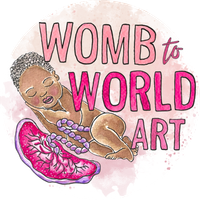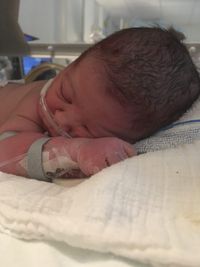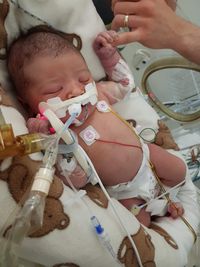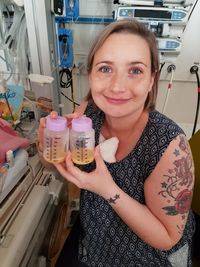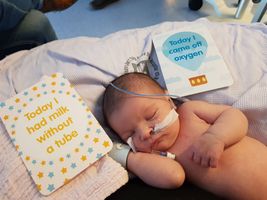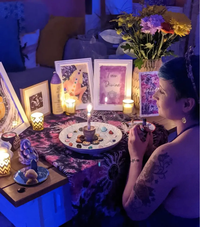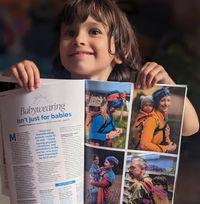NICU breastfeeding success story
Read my NICU breastfeeding success story, and how I went on to breastfeed until my Maggie was 3 years old even though I couldn't even hold her after she was born.
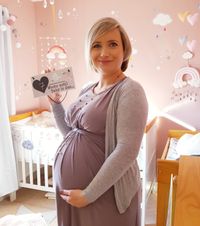
Determined to succeed
During my home birth appointment when I was 36 weeks pregnant (i was ‘that home birth woman’!), the head of community midwives advised me to ‘get some formula in ready’.
Despite knowing my intentions to breastfeed, she told me that I would likely be ‘so tired after birth that my mental health would suffer’ so I should have formula ready just in case.
I told her I was determined to breastfeed, so I didn’t want to do that - and also Co-op is just down the road if I needed it!
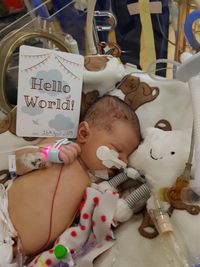
As I waited alone in recovery I took the initiative to start expressing colostrum straight away. They said I couldn’t go to her in NICU until I could feel my legs. I continued to hand express regularly, and we had brought in frozen syringes that I’d collected antenatally too, which I hoped they were feeding to her, but I’m not sure if they did.
We didn’t get much of an introduction to NICU, and we were so terrified and shocked that we weren’t thinking straight. We were told that she had aspirated a significant amount of meconium and they couldn’t confirm at that point if she’d ever come home.
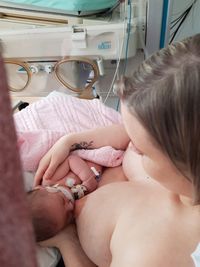
I was amazed at how strong my body’s signal was to drink water when I got let down. I still drink litres of water every day, and it felt good to be able to answer my body’s message like that.
It felt good to be doing something productive, knowing I had the power to establish and protect my milk supply until she was ready.
We did the best we could to give me the rest, nutrition and hydration I needed for establishing breastfeeding, and this was difficult when we were travelling to and forth hospital and sitting by her incubator.
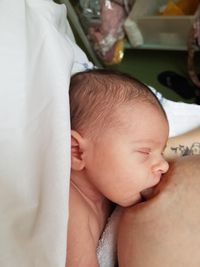
As she continued to struggle, the NICU nurse suggested giving her a bottle - which I did not want to do and I didn’t think was a helpful suggestion when we hadn’t exhausted all options. They then suggested nipple shields, which fortunately helped her to get a good-enough latch and she had her first breastfeed.
For the next few days I had to fill in a chart whenever I fed her so the doctors could be confident she was feeding well and growing fine. On her 11th day we took her home, and through bedsharing, babywearing, skin-to-skin bonding, and responsively breastfeeding - I hoped to heal what we’d lost.
But breastfeeding was hard, I kept trying without the shields, but she couldn’t get a deep enough latch to stay on, and kept ‘clicking’ as she fed.
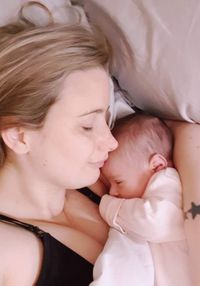
I asked the Health Visitor for support, but when the nursery nurse (who they said was the breastfeeding expert) came round, she just kept telling me ‘you’re doing great, you’re doing great!’. But I wasn’t. I was sat there, feeling broken, crying, unable to feed my baby without pain and equipment.
I tried to get help from the infant feeding team at the hospital, but when I called the midwife was abrupt and unfriendly, and they couldn’t fit me in any time soon.
I didn’t drive, and my episiotomy and 3rd degree tear wound was painfully infected for weeks. I hated knowing she was getting so much antibiotics through my milk, after her gut microbiome would have already been compromised so much by her lack of skin-to-skin and breastfeeding after birth - plus the antibiotics she had directly for sepsis. It was hard to know that my milk contained drugs that would be further damaging her microbiome as it struggled to establish.
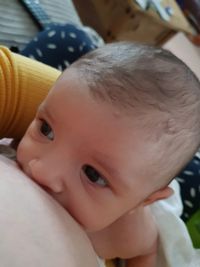
Battling for breastfeeding support was hard. We went to drop ins, I sought help on Facebook breastfeeding groups, and tried paying for a private midwife, but none of the advice I was given helped - and often contradicted what others had said.
When I did manage to be seen at the hospital, the infant feeding midwife checked Maggie for tongue tie on my request, and she made us a referral to ENT for a division.
We got an appointment for her in 6 weeks’ time - but I couldn’t wait that long - so we paid to have it privately. My nipples were very sore every time I nursed, but the doctor couldn’t find a cause. For weeks we treated her and I for thrush just in case - but it didn’t stop the pain. It felt to me like the shields were rubbing against my skin - but I had no choice but to use them.
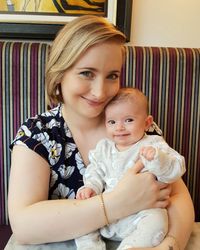
Unfortunately it wasn’t an immediate fix after the division, but after a couple more meetings with the infant feeding midwife, we finally said goodbye to the shields after two months.
And I finally got to experience the joy of an easeful breastfeed, without any wipes or sanitising products or fiddling with nipple shield cases.
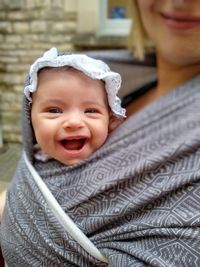
I wish that all babies - and at the
very least NICU babies - are checked for tongue tie by a trained midwife as part of newborn checks so they could have diagnosed she had a tongue tie much sooner.
I wish for mothers not to be recommended to buy in formula just-in-case, or to try a bottle when there are other things to try first, so their determination and ability to breastfeed isn’t undermined.
I wish that my hospital had had rooms available then for me to stay with her, and had found a way for me to have skin-to-skin with her much sooner, as it is known that NICU babies recover faster on their mothers.
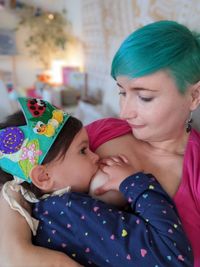
I went on to breastfeed Maggie until she was 3 years old, and I’m so proud that we managed to feed her only breastmilk despite her rough start and our separation. The other day she referred to her ‘bad start’ and I told her that’s not true - she had a wonderful start in life.
Yes, she needed some help to be born, and she was poorly afterwards. But her start in life was a lot more than that - it was also the 10 months I lovingly grew her, it was the years of responsive breastfeeding, babywearing (and toddler-wearing), skin-to-skin, the books we read, the songs we sang, the games we played, the conscious ways I’ve mothered her.
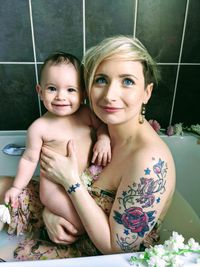
We didn’t get the birth I hoped for, but every day since I’ve done my best to be the mother she needs.
All is not lost if one thing doesn’t go how we hope.
There are always things that we can do to promote bonding, health, love and connection.
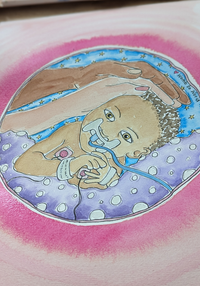
What I wish i'd known about NICU
Around 1 in 7 babies born in the UK are admitted to a neonatal unit. Having an awareness of what to expect and how to feel empowered would help parents cope and lessen their trauma if baby does need medical care, so I am urging antenatal teachers to include special care in their conversations with expectant parents - as 1 in 7 of those babies will need it.
